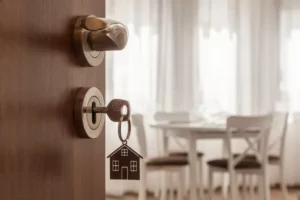The purchase of a home is one of the most important decisions you will make in your lifetime.
Closing is usually the final step. It can be a relief to reach this stage, as you’ve completed the underwriting process. But what should you expect at closing?
The contract negotiations usually determine the closing date. The closing date will be on your purchase contract. The seller accepts the offer, earnest money is paid and then you will have your closing.
The closing date may be several weeks or even months after your offer has been accepted, depending on the time needed to complete the transaction. Being prepared can help speed up the process.
Go Over Your Closing Contingencies
If you have an experienced team, the closing process will go smoothly.
You will need to make sure all the closing contingencies are completed.
These include the completion of loan documents, the home inspection, and the purchase of homeowners insurance.
Usually, the final walkthrough is scheduled 24 hours prior to closing. This is not the inspection. Your agent should schedule a final walkthrough. During this period, the seller should remove all of their belongings.
If the condition of the house does not match what you agreed upon, then let your agent know.
Common problems that delay closings
As we have already mentioned, it can take weeks or months to reach a closing date. You can avoid some of the biggest obstacles by knowing what they are. The following are some of the things which can delay the closing date:
* Appraisal problems
* Loan Issues – Preapproval can help avoid loan issues
* Home inspection problems
* Issues that may arise during the walkthrough
* Problems with the paperwork
Closing costs
Closing costs are incurred once you reach your closing date. These are third-party fees that must be paid before your home purchase can be finalized.
Closing costs tend to include attorney fees, appraisal fees, and your homeowners insurance premium.
Closing fees can range anywhere between 3 and 4% of your home’s purchase price.
Your lender should send a Closing Disclosure to you at least three days before the closing date. This will give you all the details and costs as well as who is responsible for what and how much. Make sure that these costs match the information you received in your loan estimate.
What Happens During the Day?
When you arrive on the closing date, you will need to bring a photo ID, any paperwork that is still needed by the mortgage loan officer, title company or other parties, and a certified check or cashier’s cheque. The check must be made payable to either the title company or closing company. The check is to cover any closing costs not deducted from the sale price.
You will pay the remaining closing costs on closing day. These are the costs you should have already been aware of after reviewing your Closing Disclosure.
The seller signs documents transferring ownership.
You will need to sign several documents, including a settlement note that details all costs associated with the sale, an mortgage note stating your promise to repay the loan and a deed or mortgage of trust. A title company then registers the deed under your name.
If you have already signed your contract, you will be able move into your new home as soon as all the paperwork is complete.
Original Blog: https://realtytimes.com/consumeradvice/buyersadvice/item/1040826-what-to-expect-when-you-close-on-a-house?rtmpage=
